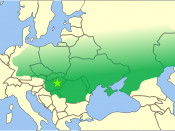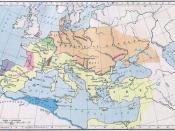Attila the Hun
Attila the Hun had a very complex life since the moment he was born. Attila was probably from an Asiatic tribe that the Chinese called Huing-nu, also meaning "common slaves." He was from a royal bloodline that provided leaders for the Huns; therefore, Attila became a leader. His family believed in the healing, prophetic, and visionary powers of their shamans. Shortly after the death of his father, King Mundzuk, Attila was sent to live with his uncle, King Rugila. King Rugila sent him as a child hostage to the court of Honorius, Emperor of the Western Roman Empire at Ravenna. Attila's experience at the court of Honorius gave him experience with the Huns, which influenced the way he would lead his respective nation as an adult. After Attila's departure from Ravenna, he traveled among the tribes of Huns for 20 years, persuading fiercely independent chieftains to support his plan for a great conquest by a new Hunnic confederacy.
In 434 A.D. the Huns had gained enormous power under Attila and his brother Bleda. Together the brothers negotiated a treaty with Theodosius II that required the eastern Roman Empire to pay the Huns a huge tribute of gold in return for peace. It is believed that Attila murdered Bleda around 445 A.D.
When Attila was soul ruler of the Huns, he had a vision for their future, which suggested world governance secured by his mighty army. The army would be trained according to the Roman model. Attila was known among Germanic tribes as "Etzel." He established his capital city, Etzelnbuag, in Pannonia.
Attila destroyed many cities and people. For instance he defeated the Visogoths, the Franks, and the Burgundians. Who took any of the survivors from these tribes and made them fight for him. In 451 A.D. Attila...
![[Forum Boario, Rome, Italy] (LOC)](https://s.writework.com/uploads/17/171586/forum-boario-rome-italy-loc-thumb.jpg)

